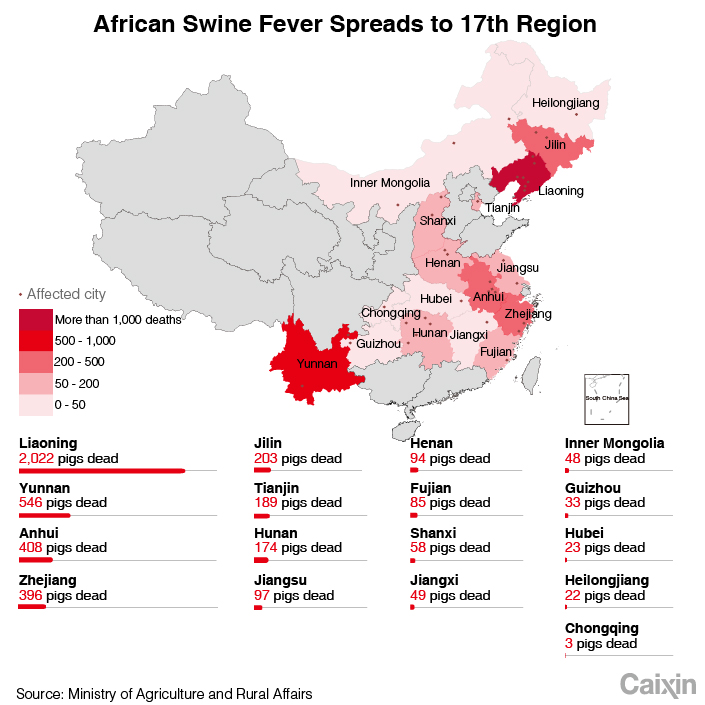China Blames Spread of Deadly Pig Disease on ‘Lawless Elements’ and Dirty Vehicles
Unhygienic transportation of pigs and “lawless elements” that ignore restrictions on swine movement are to blame for the spread of deadly African swine fever across China, authorities said Wednesday.
Seventeen provincial-level areas have been hit by the disease, which does not affect humans but can be fatal to infected pigs, the Agriculture, Transport and Public Security ministries said in a rare joint statement.
A government survey has found that long-distance transportation was the main cause for the virus-borne fever’s wide reach, the ministries said. They blamed vehicles that “do not meet epizootic prevention requirements” or that hadn’t been cleaned or disinfected.
 |
Graphic: Gao Baiyu/Caixin |
Some “lawless elements driven by profit” who had moved pigs out of high-risk areas were also blamed for spreading the disease. The statement called for stricter inspections of vehicles transporting animals.
The outbreak in China, the world’s largest pork market, is “pushing China’s hog prices higher” and could “force a shakeup of the global pork market,” sending ripples through the grain and animal-feed industries as well, according to a report by U.S. farm credit bank CoBank.
The country’s first case of African swine fever was reported in August in the northeastern province of Liaoning. At least 200,000 animals have been culled as part of efforts to control the disease, Reuters reported in late October.
The virus, initially concentrated in China’s north and northeast, has spread to the southwestern province of Yunnan, a major pork production and consumption hub.
The latest case to be announced Thursday afternoon was an outbreak in Huanggang, Hubei province, that infected 24 out of 636 animals on a single farm, killing 13.
Contaminated pig feed also has been blamed for the spread of swine fever in China. Major animal-feed company Tangrenshen Group Co. Ltd. disclosed on Monday that government officials in Anhui province had found suspected traces of the virus in one of its subsidiary’s products, and that it was investigating the matter.
African swine fever is highly contagious and is spread through physical contact and ingestion of products made from infected animals, according to the European Food Safety Authority.
Contact reporter Teng Jing Xuan (jingxuanteng@caixin.com)

- 1Cover Story: China Carves Out a Narrow Path for Offshore Asset Tokenization
- 2Drownings Shake Chinese Enthusiasm for Travel to Russia
- 3Over Half of China’s Provinces Cut Revenue Targets
- 4Li Ka-Shing’s Port Empire Hit by Forced Takeover Amid Panama Legal Dispute
- 5In Depth: China’s Mutual Fund Industry Faces Overhaul After a Banner 2025
- 1Power To The People: Pintec Serves A Booming Consumer Class
- 2Largest hotel group in Europe accepts UnionPay
- 3UnionPay mobile QuickPass debuts in Hong Kong
- 4UnionPay International launches premium catering privilege U Dining Collection
- 5UnionPay International’s U Plan has covered over 1600 stores overseas






